Me: I think it's great that you did because I feel it helps a lot of young people who are struggling with coming out. They see someone who's successful and has so much going for him and who happens to be gay. It shows them that they can have a real complete life. You and Brad have been together for 25 years now and it really shows them you can have everything everyone else has and it just happens to be two guys.
George: Well, we don't have everything yet, but advances are being made. Four years ago when we elected the first African American president, California had a heartbreak that same night when Prop 8 was passed. That election was bittersweet. It was wonderful. It was historic that an African American won as President of the United States, but on that same ballot was Prop 8 and it passed by a sliver of a margin. Four years later we had four marriage equality bills on the ballot in four different states in that election last November. The amazing thing that happened that election night was not only did Obama, our first African American President get re-elected, but we won all four states, three marriage equality bills and the fourth was stopping the attempt to add to the constitution of Minnesota that marriage equality would be bad.
Just earlier this week, for the first time ever the President's inaugural address included the gay community when he said, "It is now our generation’s task to carry on what those pioneers began. For our journey is not complete until our wives, our mothers, and daughters can earn a living equal to their efforts. Our journey is not complete until our gay brothers and sisters are treated like anyone else under the law -- for if we are truly created equal, then surely the love we commit to one another must be equal as well."
I think great things are going to happen this summer when the Supreme Court hears the two bills: the challenge to Prop 8 and the challenge of DOMA. Prop 8 has already been ruled unconstitutional by the Federal District Court and Circuit Appellate Court. We are sure Prop 8 is going down. I am the optimist; I think we will get rid of DOMA.
Amazing things are happening and it is changing and that should give us the confidence to continue to break down all the laws to equality.
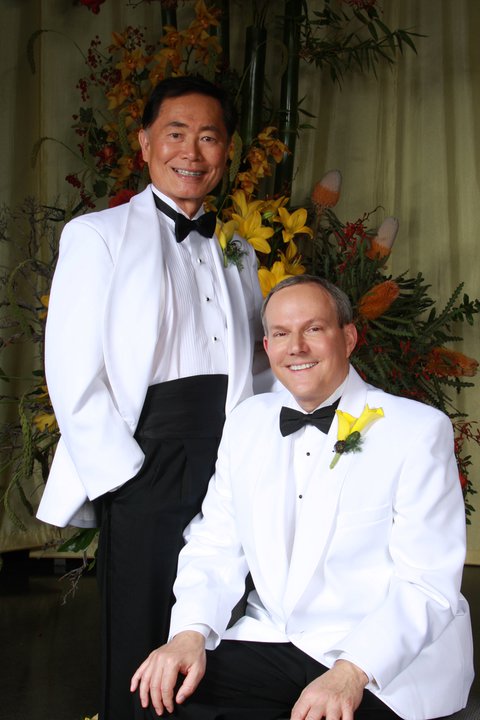 George and Brad Takei: Photo Credit: Toyo Miyatake Studio
George and Brad Takei: Photo Credit: Toyo Miyatake Studio
16. What was it like when you and Brad were invited onto The Newlywed Game as their first gay couple? That was fun, but what was really a breakthrough was when I served as President Clinton's appointee on the Japan-United States Friendship Commission, and while I was serving on the commission, the Prime Minister of Japan made a state visit to Washington DC. The President and First Lady Clinton hosted a State dinner for the Japanese Prime Minister and we, Brad and I, received an invitation.
There we were at this dinner, dressed up amongst all these dignitaries, and when it came our turn to be announced for the welcoming line, they said Mr. George Takei and Mr. Brad Altman. I don't know whether this was a first time or not that a Mr. & Mr. were introduced to the President of the United States, but it was thrilling nonetheless. We hope to be there for another State dinner when the President and the First Gentleman are introduced to us [George Laughs].
Bonus Questions:
17. There are some celebrities have not been able to handle the success and fame they've had. How have you been able to stay grounded and continued to have such success? I have taken to heart that Star Trek mission statement, "To boldly go where no man has gone before." I like new challenges and new opportunities to contribute to society. When I'm doing advocacy for LGBT equality, generally, when I go on speaking engagements to universities or corporations or government agencies, there are kindred souls there already, whether they are LGBT themselves or friends of LGBT people or those people who are open minded.
In order to bring about real change, we need to get to the broad middle that's made up of decent fair-minded people, who in their daily course of working keeps them from thinking about issues other than what their personal issues are. They're decent people, but if they should be confronted with a situation or ballot measure, they are going to be fair about. We've got to get them thinking and find that group of people.
Brad is addicted to The Howard Stern Show. I'm not, I wasn't. Brad said a lot Stern's listeners are good people, but some of them say homophobic things. They don't think about the issues because they are not personal to them. We've got to reach those people. Brad urged me to go on Howard Stern, so I "boldly went" and I discovered Howard to be a good guy. He's one of those decent, fair-minded people. His cache is making outrageous statements or doing outrageous things, but he's a keen interviewer. When he smells hypocrisy or evasion, he hones in on that. If he can't get an honest answer this way, he'll get it from this side, or this side, or if he still doesn't get the honest answer he's looking for, he'll go this way (as if pointing to someone's behind) [George Laughs]. He'll "boldly go" wherever to get the truth.
Going on his show allowed me to humanize what it means to be gay. I gave a face to what it means to be gay. I reach a whole new audience. Life is more interesting when you make those discoveries with people like Howard. So taking on new adventures keep me grounded.
18. What's the best advice you've ever received? My father gave me a lot of advice, but the best advice he gave me was what made me be an activist and engaged in the political process. When I was a teenager and we had those discussions about the Japanese American internment, he said, "Both the strength and the weakness of American Democracy is in the fact that it is a people's Democracy and it can be as great as the people can be, but it's also as fallible as people are.
So our Democracy is dependent on good people and by good people, he meant, people who are informed, rational, who don't panic into hysteria, who are actively engaged in the political process, and be there to keep the ideals of our system on a straight line."
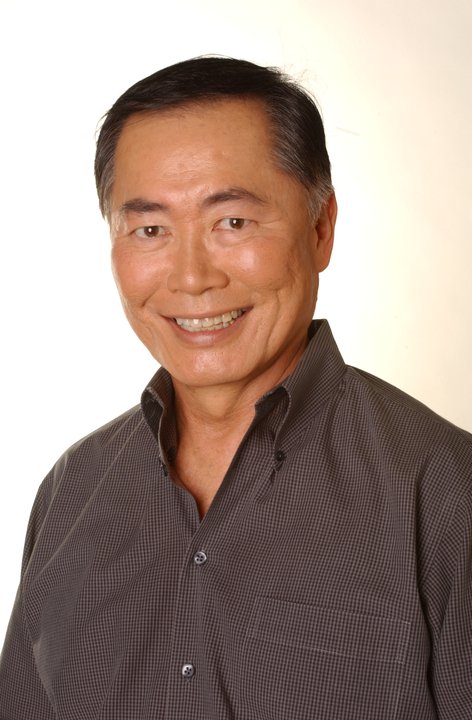 George Takei
George Takei
More on George Takei:
George received a star on Hollywood Boulevard's Walk of Fame in 1986 and he placed his signature and handprint in the forecourt of the landmark Grauman's Chinese Theater in Hollywood in 1991. He has more than 40 feature films and hundreds of television guest-starring roles to his credit.
It began in the summer of 1957, between his freshman and sophomore years at the University of California at Berkeley, when George answered a newspaper advertisement placed by a company casting voices for a motion picture. The film was Rodan, a Japanese science-fiction classic about a prehistoric creature terrorizing a southern Japanese city. In a sound stage on the MGM lot in Culver City, Calif., George dubbed the original Japanese lines into English, creating distinct voices for eight characters.
George's professional acting debut occurred on a 1959 episode of the pioneering live television drama series, Playhouse 90. His motion picture debut was in Ice Palace starring Richard Burton, released by Warner Brothers in 1959. His other films include six Star Trek motion pictures (Star Trek VI: The Undiscovered Country, Star Trek V: The Final Frontier, Star Trek IV: The Voyage Home, Star Trek III: The Search for Spock, Star Trek II: The Wrath of Khan, Star Trek: The Motion Picture), Larry Crowne, The Great Buck Howard, The Red Canvas, You Don't Mess With the Zohan, Ninja Cheerleaders, DC 9/11: Time of Crisis, The Green Berets, Majority of One, New World Order aka Noon Blue Apples, Who Gets the House?, Trekkies, The Best Bad Thing, Patient 14, Chongbal aka Vanished, Live by the Fist, Bug Busters, Kissinger and Nixon, Prisoners of the Sun aka Blood Oath, Return From the River Kwai, Red Line 7000, Never So Few, Walk Don't Run, An American Dream, P.T. 109, Oblivion, The Loudmouth, Which Way to the Front?, Bicycle Built for Three, and Hell to Eternity.
In addition to his role in the original Star Trek series, other television appearances include Celebrity Apprentice, Ellen: The Ellen DeGeneres Show, Late Show with David Letterman, Conan, The Wendy Williams Show,True Justice, The Big Bang Theory, Community, The Tonight Show with Jay Leno, Suite Life on Deck, Party Down, I'm A Celebrity, Get Me Out of Here!, Late Late Show With Craig Ferguson, Late Night with Conan O'Brien, Heroes, Secret Talents of the Stars, Wanna Bet?, Thank God You're Here, The Bronx Bunny Show, Jimmy Kimmel Live!, Cory in the House, Psych, Comedy Central Roast of William Shatner, Will & Grace, Malcolm in the Middle, Freddie, Scrubs, 3rd Rock From the Sun, Murder She Wrote, Watching Ellie, Grosse Pointe, Early Edition, Diagnosis Murder, The Young and the Restless, Alienated, In the House, John Woo's Once a Thief, Homeboys in Outer Space, Muppets Tonight, Brotherly Love, Mission: Impossible, Twilight Zone, Perry Mason, Hallmark Hall of Fame, Miami Vice, I Spy, Son of the Beach, Marcus Welby, M.D., Hawaiian Eye, Hawaii Five-O, Ironside, Kung Fu, Mr. Novak, Mr. Roberts, The Six Million Dollar Man, Voyage to the Bottom of the Sea, The Wackiest Ship in the Army, Death Valley Days,Baa Baa Black Sheep, Bracken's World, Combat, Chico and the Man, General Hospital, The Courtship of Eddie's Father, MacGyver, Californians, Chrysler Theatre, U.S. Steel Hour, My Three Sons, and many others.
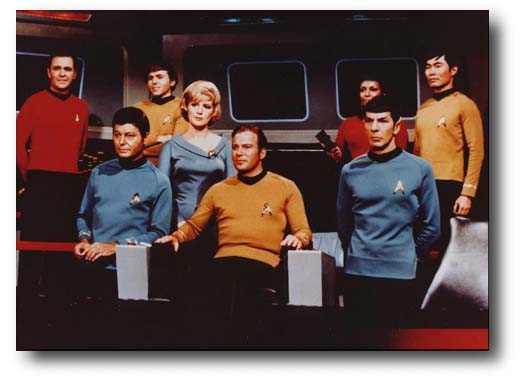 The original cast of Star Trek
The original cast of Star Trek
George is always in demand as a vocal artist. Among his credits is a music industry accolade -- in 1987, George and Leonard Nimoy shared a Grammy Award nomination for Star Trek IV: The Voyage Home (cassette) in the "Best Spoken Word or Non-Musical Recording" category.
George's distinctive voice is heard in The National Parks: America's Best Idea, a six-episode series directed by Ken Burns and written and co-produced by Dayton Duncan that aired on PBS in the fall of 2009. George's voice was featured in two episodes of George Lucas' cartoon version of Star Wars: The Clone Wars airing on the Cartoon Network in January 2009 as well as in Walt Disney Pictures' full-length animated features, Mulan and Mulan II, Star Trek audio novel recordings, Fox Television's The Simpsons, Futurama, Adventure Time, and in numerous voice-overs and narrations.
Widely recognized for his vocal talents, George has been a guest narrator with numerous symphony orchestras. In February 2012, George narrated A Survivor from Warsaw with the Arkansas Symphony Orchestra conducted by Philip Mann. He narrated Sci-Fi Spectacular with the Milwaukee Symphony Orchestra in June 2012, Toronto Symphony Orchestra in May 2012, Detroit Symphony Orchestra in March 2012, Kansas City Symphony in January 2012, Naples (Florida) Philharmonic Orchestra in January 2011, Indianapolis Symphony Orchestra in July 2010, Cleveland Orchestra in August 2009, Ottawa Symphony Orchestra in April 2009, Edmonton Symphony Orchestra in January 2009, Baltimore Symphony Orchestra in January 2008, and Seattle Symphony in September 2007. All "Sci-Fi" concerts were conducted by Jack Everly.
George narrated Look to the Future with the San Francisco Symphony in July 2009. In February 2008, George hosted To Boldly Go with the Minnesota Orchestra conducted by Sarah Hatsuko Hicks. In November 2004, George narrated Copeland's Lincoln Portrait with the Honolulu Symphony conducted by Samuel Wong. He has narrated Johan de Meij's Symphony No. 1: The Lord of the Rings with the Springfield, Mass., Symphony Orchestra conducted by Kevin Rhodes as well as with the Long Island Philharmonic, Denver Symphony Orchestra, Orange County California Wind Orchestra, and the Imperial Symphony Orchestra of Lakeland, Florida, all conducted by David Warble.
Serving as co-hosts, George and actor-comedian Margaret Cho provide the narration for the 2006 Peabody Award-winning Crossing East, a radio documentary produced by Dmae Roberts divided into eight hour-long installments that trace the history of Asian American immigration to the United States.
In October 2007, an asteroid was named in honor of George. The asteroid's official, scientific name is 7307 Takei. The name was approved by the International Astronomical Union's Committee on Small Body Nomenclature. The asteroid is located between Mars and Jupiter and is approximately 5 miles in diameter.
 George Takei on The Howard Stern Show
George Takei on The Howard Stern Show
George is a regular guest on The Howard Stern Show on Sirius XM Radio. George was the announcer and on-air personality during Stern's debut week in January 2006. George has made in-studio appearances on the show in 2007, 2008, 2009, 2010, 2011 and 2012.
George is a member of the Academy of Motion Picture Arts and Sciences, Academy of Television Arts and Sciences, Actors' Equity Association, American Federation of Television and Radio Artists, and the Screen Actors Guild, which he joined in January 1959. He is also part of The Equal Employment Opportunities Committees of Actors' Equity Association and American Federation of Television and Radio Artists, and the Ethnic Employment Opportunities Committee of Screen Actors Guild, awarded George the 7th annual Ivy Bethune Tri-Union Diversity Award in June 2009.
George's theatrical credits include Shimon Wincelberg's Undertow, winner of the Scotsman First Award at the Edinburgh Festival, and The Wash, written by Philip Kan Gotanda and presented in New York at the Manhattan Theater Club and in Los Angeles at the Mark Taper Forum. He performed in Frank Chin'sYear of the Dragon at the American Place Theater in New York and in Fly Blackbird! at the Billy Rose Theater in New York and the Metro Theater in Los Angeles.
George played in a musical version of Snow White at the Dome Theater in Brighton, England, and was the genie in Aladdin at the Hexagon Theatre in Reading, England. George starred in Peter Shaffer's Equus, directed by Tim Dang, at East West Players in Los Angeles, in 2005. Also in the theatrical arena, George appeared in The Human Race Theatre Company concert production of Stephen Sondheim's Pacific Overtures at the Loft Theatre in Dayton, Ohio, in June 2002. More recently, George played the "Emperor of China" in a holiday pantomime production of Aladdin at The Central Theatre in Chatham, England. In March 2012, George performed in an all-star reading and Los Angeles premiere of 8, a play written by Dustin Lance Black and directed by Rob Reiner, at the Wilshire Ebell Theatre. The fundraiser for the American Foundation for Equal Rights raised $2 million for AFER's fight for the freedom to marry for gay and lesbian Americans.
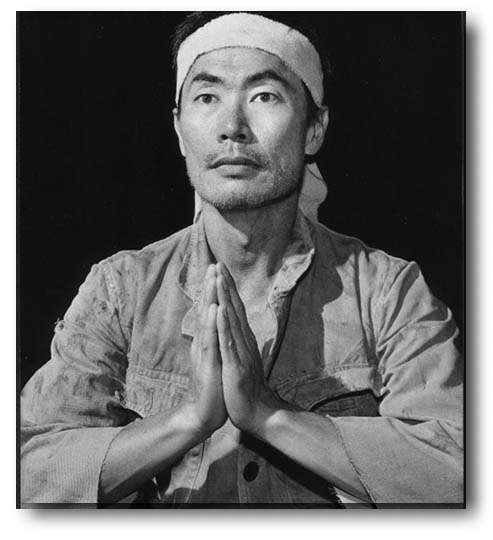 Publicity photo for the play "Undertow" by Shimon Wincelberg
Publicity photo for the play "Undertow" by Shimon Wincelberg
Edinburgh, Scotland 1988, Photo courtesy of www.georgetakei.com
George and Tony Award winner Lea Salonga just developed the new musical called Allegiance (music and lyrics by Jay Kuo, book by Jay Kuo and Lorenzo Thione). The musical is an epic story of love, family and heroism during the Japanese American internment. Allegiance's world premiere at the Old Globe Theatre in San Diego in September 2012 broke box office and attendance records. A Broadway run will take place in the Fall of 2013.
In addition to his acting career, George always has been extremely involved in civic affairs. Along with actress Beulah Quo, George produced and hosted a public affairs show, Expression East/West, which aired on KNBC-TV in Los Angeles from 1971 to 1973. Always a political activist, George ran for the Los Angeles City Council in 1973, losing by a small percentage. At a crossroads, he had to decide whether to pursue a political career or an acting career. He decided on acting, but to remain involved in civic affairs to whatever extent he could. George was appointed by Los Angeles Mayor Tom Bradley to the board of directors of the Southern California Rapid Transit District, serving from 1973 to 1984. George was one of the driving forces behind the Arts in Transit program in which every Metro Rail subway station is given its own distinctive look, thereby fostering neighborhood pride. He also served as a vice president of the American Public Transit Association. In the international arena, George was appointed by President Clinton to the board of the Japan-United States Friendship Commission, where he served two terms. He is a member of the board of directors of the US-Japan Bridging Foundation. The Government of Japan recognized George's contribution to the Japan-United States relationship by giving him the Order of the Rising Sun, Gold Rays with Rosette. The decoration was conferred by His Majesty, Emperor Akihito, at the Imperial Palace in Tokyo in November 2004.
 George Takei, Lea Salonga, and Telly Leung
George Takei, Lea Salonga, and Telly Leung
World Premiere of Allegiance at The Old Globe Theatre
Photo Credit: Doug Gates
A member of the Human Rights Campaign, the largest national lesbian, gay, bisexual, and transgender political organization, George was a spokesman for HRC's Coming Out Project. In April 2006, he embarked on a nationwide speaking tour called "Equality Trek" in which he talked about his life as a gay Japanese American. Star Trek's Leonard Nimoy presented George with HRC's Equality Award at its San Francisco gala dinner in July 2007.
George and his husband, Brad Takei, are residents of Los Angeles. They met while running with the Los Angeles Frontrunners in the early 1980s. Life partners for more than two decades, they were married on September 14, 2008, in the Democracy Forum of the Japanese American National Museum in Los Angeles. By a narrow margin, California voters approved Proposition 8 on November 4, 2008, restricting marriages in California to opposite-sex couples. However, the California Supreme Court ruled that approximately 18,000 same-sex marriages that took place during a four-and-one-half month period prior to November 4, 2008, remain legally valid.
On October 13, 2009, George and Brad made television history when they became the first gay couple to be invited to appear on The Newlywed Game, the long-running show now airing on GSN cable network. They won the game, earning a $10,000 donation for the Japanese American National Museum.
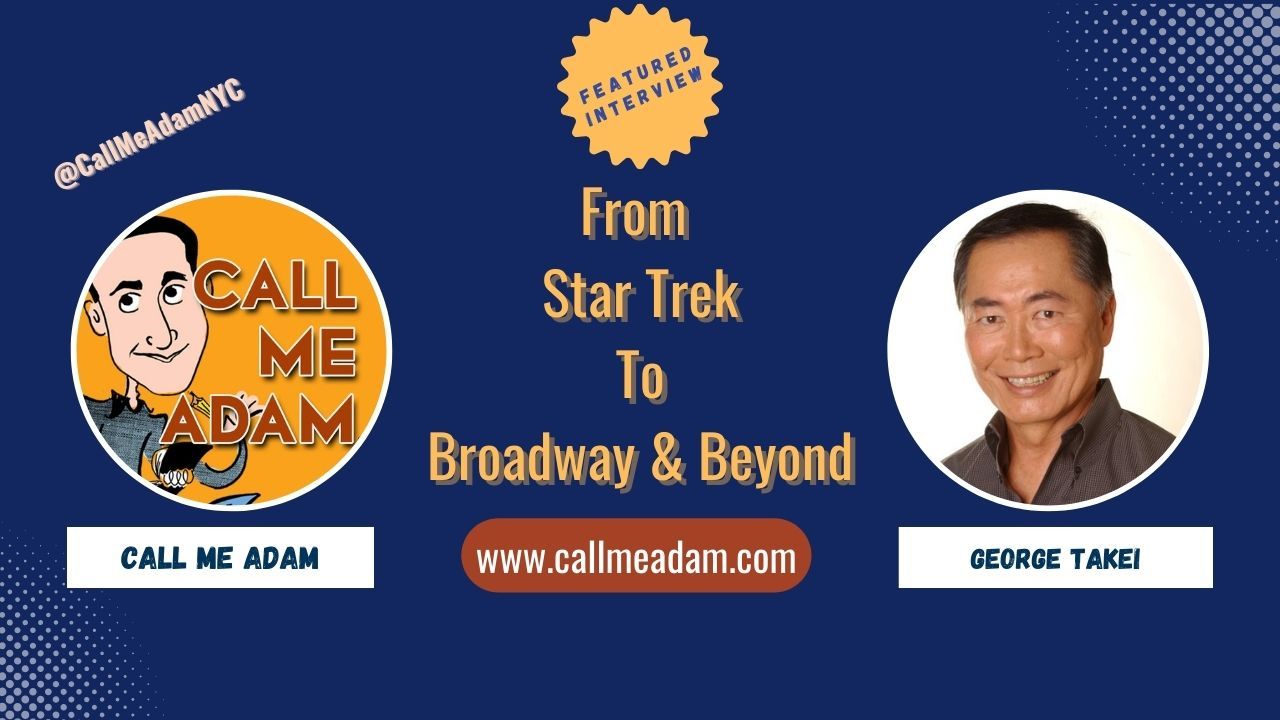
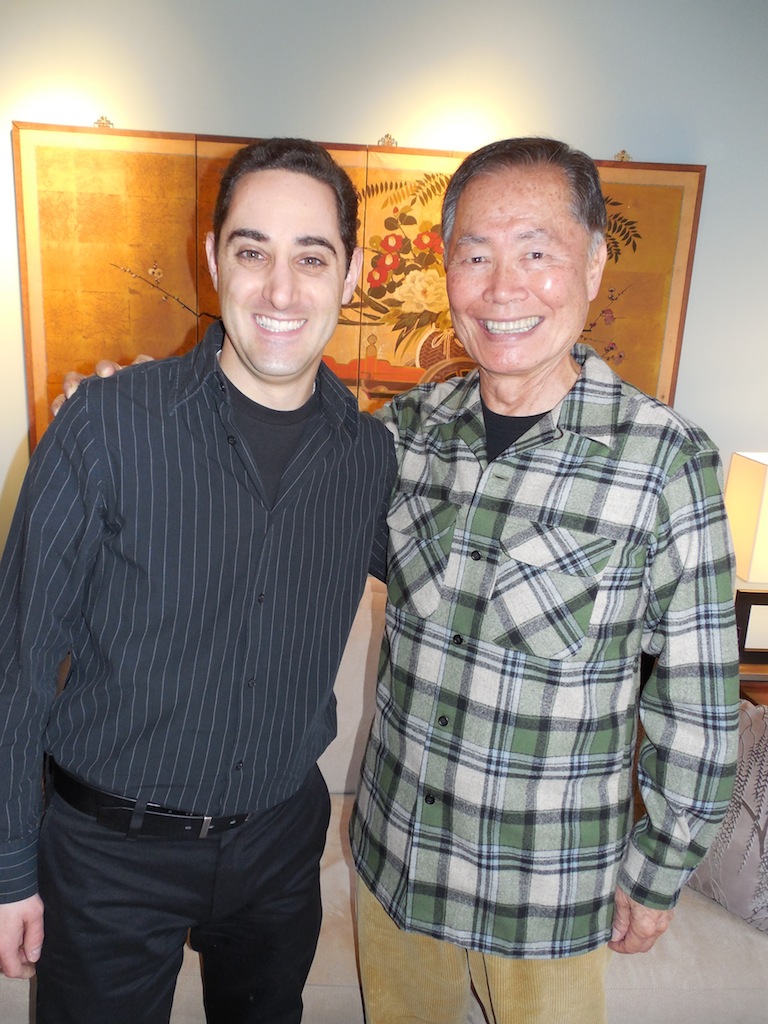 Me and George Takei
Me and George Takei George Takei at the opening of Allegiance
George Takei at the opening of Allegiance George Takei, Lea Salonga and Telly Leung
George Takei, Lea Salonga and Telly Leung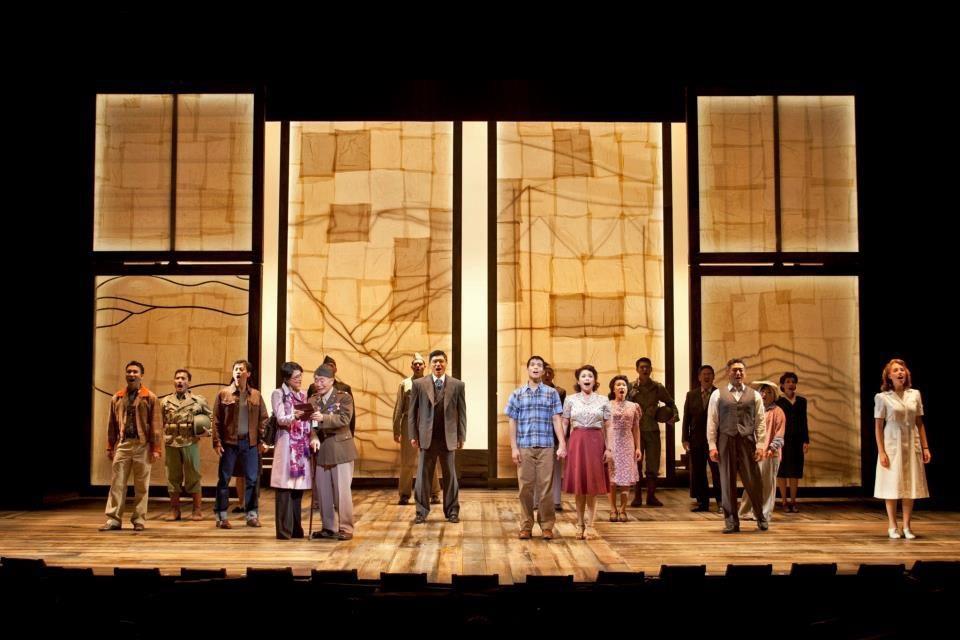 Cast of Allegiance at The Old Globe Theatre
Cast of Allegiance at The Old Globe Theatre George Takei in kindergarten in the
George Takei in kindergarten in the George Takei as "Mr. Sulu" on Star Trek
George Takei as "Mr. Sulu" on Star Trek George Takei in NOH8 Campaign, Photo Credit: Adam Bouska
George Takei in NOH8 Campaign, Photo Credit: Adam Bouska George and Brad Takei: Photo Credit: Toyo Miyatake Studio
George and Brad Takei: Photo Credit: Toyo Miyatake Studio  George Takei
George Takei The original cast of Star Trek
The original cast of Star Trek George Takei on The Howard Stern Show
George Takei on The Howard Stern Show Publicity photo for the play "Undertow" by Shimon Wincelberg
Publicity photo for the play "Undertow" by Shimon Wincelberg George Takei, Lea Salonga, and Telly Leung
George Takei, Lea Salonga, and Telly Leung

